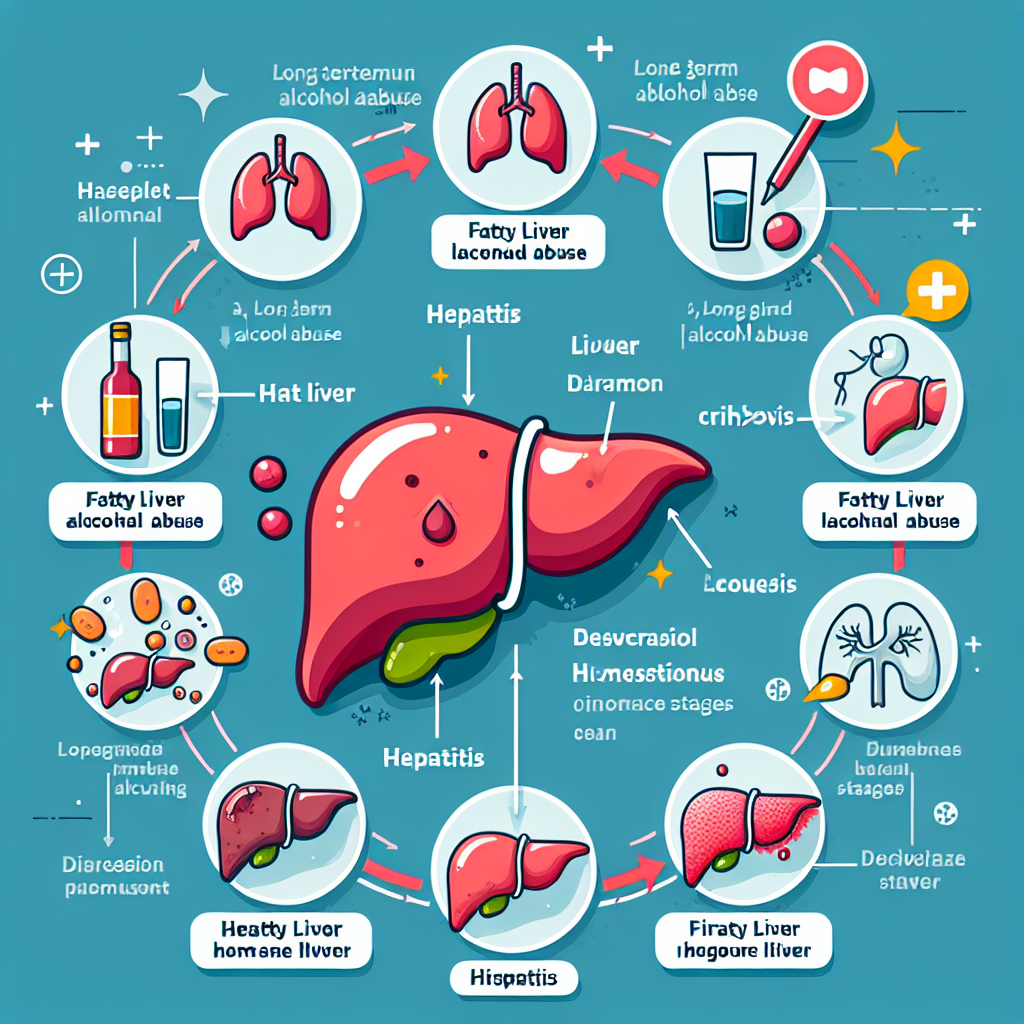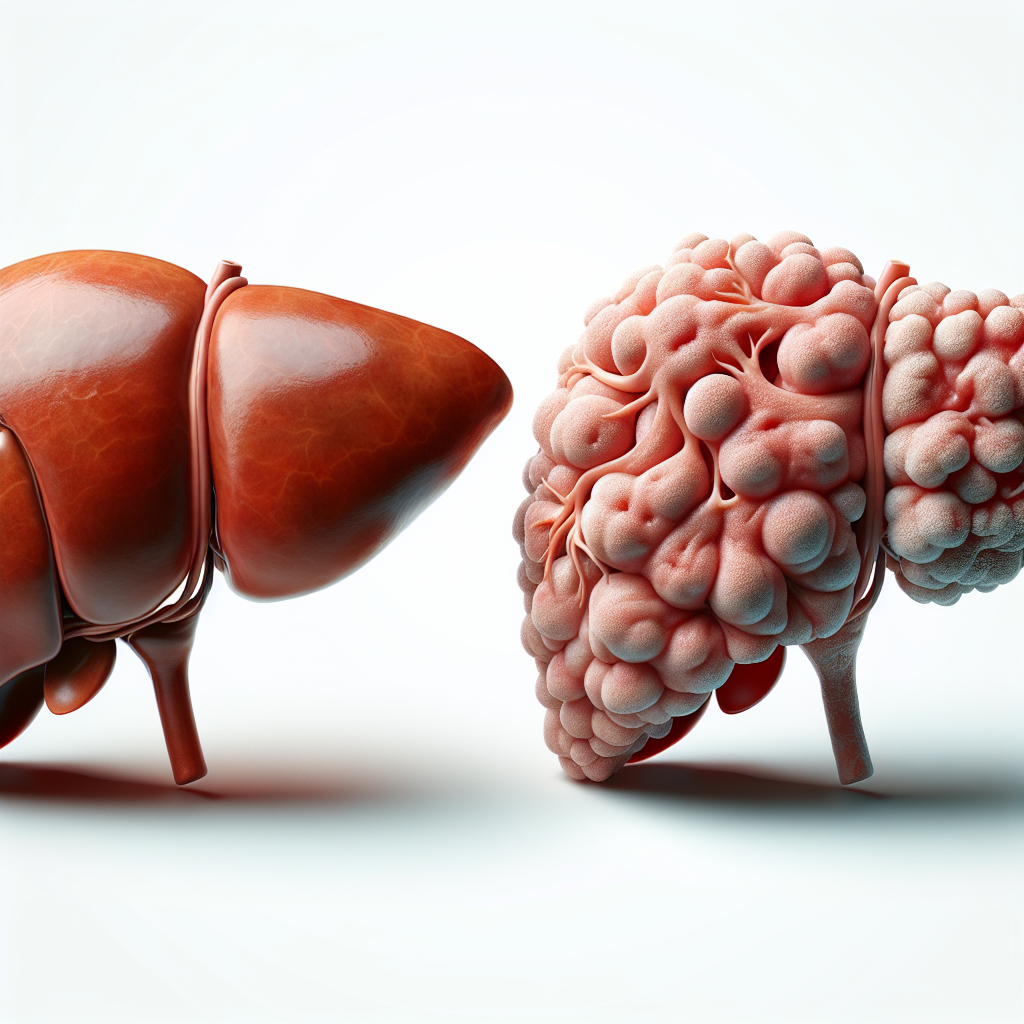-
Table of Contents

“Long-term alcohol abuse: A direct path to irreversible liver damage.”
Introduction
Long-term alcohol abuse can indeed cause significant liver damage, a condition that is well-documented and widely recognized in medical literature. Chronic consumption of alcohol over extended periods can lead to a range of liver-related health issues, including fatty liver disease, alcoholic hepatitis, and cirrhosis. These conditions result from the liver’s inability to effectively process and detoxify the excessive amounts of alcohol, leading to inflammation, scarring, and ultimately, impaired liver function. The progression of liver damage due to alcohol abuse can be insidious, often developing over years of heavy drinking, and can result in severe health consequences, including liver failure and increased risk of liver cancer. Understanding the impact of long-term alcohol abuse on the liver is crucial for both prevention and treatment of these potentially life-threatening conditions.
The Impact Of Long-Term Alcohol Abuse On Liver Health
Long-term alcohol abuse can have a profound impact on liver health, leading to a range of serious conditions that can significantly affect an individual’s quality of life. The liver, a vital organ responsible for detoxifying the blood, producing essential proteins, and aiding in digestion, is particularly vulnerable to the effects of chronic alcohol consumption. Understanding the relationship between alcohol and liver health is crucial for those seeking to make informed decisions about their drinking habits and overall well-being.
When alcohol is consumed, it is metabolized primarily in the liver. This process generates toxic byproducts, such as acetaldehyde, which can cause inflammation and damage to liver cells. Over time, the liver’s ability to repair itself diminishes, leading to a progressive decline in function. One of the earliest stages of alcohol-related liver damage is fatty liver disease, characterized by the accumulation of fat within liver cells. Although fatty liver disease is often asymptomatic and reversible with abstinence from alcohol, it can progress to more severe conditions if drinking continues.
As alcohol abuse persists, the risk of developing alcoholic hepatitis increases. This condition involves inflammation and destruction of liver cells, resulting in symptoms such as jaundice, abdominal pain, and fever. Alcoholic hepatitis can be life-threatening, particularly in severe cases, and requires immediate medical intervention. The progression from fatty liver disease to alcoholic hepatitis underscores the importance of early detection and lifestyle changes to prevent further damage.
If alcohol consumption continues unchecked, the liver may develop cirrhosis, a condition characterized by extensive scarring and irreversible damage. Cirrhosis impairs the liver’s ability to perform its essential functions, leading to complications such as portal hypertension, variceal bleeding, and hepatic encephalopathy. The development of cirrhosis marks a critical turning point, as the damage is permanent and can only be managed, not cured. However, even at this advanced stage, reducing or eliminating alcohol intake can slow the progression of the disease and improve overall health outcomes.
The impact of long-term alcohol abuse on liver health extends beyond the physical damage to the organ itself. It also affects an individual’s mental and emotional well-being, as well as their social and economic circumstances. Chronic liver disease can lead to fatigue, cognitive impairment, and a diminished ability to perform daily activities, which can, in turn, affect relationships and employment. Recognizing the far-reaching consequences of alcohol abuse is essential for motivating individuals to seek help and make positive changes.
Inspiring stories of recovery and resilience abound, demonstrating that it is never too late to take control of one’s health. Many individuals who have struggled with alcohol dependence have successfully turned their lives around by seeking support from healthcare professionals, joining support groups, and adopting healthier lifestyles. These stories serve as powerful reminders that change is possible and that the journey to better liver health begins with a single step.
Ultimately, the impact of long-term alcohol abuse on liver health is a sobering reminder of the importance of moderation and self-care. By understanding the risks and taking proactive measures to reduce alcohol consumption, individuals can protect their liver and improve their overall quality of life. The path to recovery may be challenging, but with determination, support, and a commitment to change, it is possible to overcome the damaging effects of alcohol and embrace a healthier future.
Understanding The Connection Between Chronic Alcohol Consumption And Liver Damage
Understanding the connection between chronic alcohol consumption and liver damage is crucial for fostering awareness and encouraging healthier lifestyle choices. The liver, a vital organ responsible for numerous essential functions, including detoxification, protein synthesis, and the production of biochemicals necessary for digestion, is particularly vulnerable to the effects of long-term alcohol abuse. Chronic alcohol consumption can lead to a spectrum of liver diseases, ranging from fatty liver to cirrhosis, and even liver cancer. Recognizing the signs and understanding the mechanisms behind this damage can inspire individuals to make informed decisions about their alcohol intake.
When alcohol is consumed, it is metabolized primarily in the liver. During this process, alcohol is converted into acetaldehyde, a toxic substance that can cause significant damage to liver cells. Over time, excessive alcohol consumption overwhelms the liver’s ability to process and detoxify these harmful substances, leading to inflammation and the accumulation of fat within liver cells. This condition, known as alcoholic fatty liver disease, is often the first stage of alcohol-related liver damage. Although fatty liver is reversible with abstinence from alcohol, continued drinking can progress the condition to more severe forms of liver disease.
As alcohol abuse persists, the liver’s inflammatory response can lead to alcoholic hepatitis, a more serious condition characterized by liver cell damage and inflammation. Symptoms of alcoholic hepatitis can include jaundice, abdominal pain, fever, and nausea. While some individuals may experience mild symptoms, others can suffer from severe liver dysfunction, which can be life-threatening. The progression from fatty liver to alcoholic hepatitis underscores the importance of early intervention and lifestyle changes to prevent further damage.
If alcohol consumption continues unabated, the liver’s ability to regenerate and repair itself becomes increasingly compromised. This can result in the development of cirrhosis, a condition where healthy liver tissue is replaced by scar tissue, impeding the liver’s functionality. Cirrhosis is often irreversible and can lead to severe complications such as liver failure, portal hypertension, and an increased risk of liver cancer. The journey from fatty liver to cirrhosis highlights the cumulative and progressive nature of alcohol-induced liver damage, emphasizing the need for sustained efforts to reduce alcohol intake.
Despite the grim reality of alcohol-related liver disease, there is hope for those willing to make positive changes. Abstinence from alcohol can halt the progression of liver damage and, in some cases, even reverse certain conditions. For individuals with fatty liver or early-stage alcoholic hepatitis, quitting alcohol can lead to significant improvements in liver health. For those with more advanced liver disease, such as cirrhosis, abstinence can prevent further deterioration and improve overall quality of life. Additionally, medical interventions, lifestyle modifications, and support from healthcare professionals can play a pivotal role in managing and mitigating the effects of chronic alcohol consumption.
Understanding the connection between chronic alcohol consumption and liver damage serves as a powerful reminder of the impact our choices have on our health. By raising awareness and promoting informed decision-making, we can inspire individuals to take proactive steps towards reducing their alcohol intake and safeguarding their liver health. The journey towards recovery and better health is challenging but achievable, and it begins with the recognition of the profound effects of alcohol on the liver and the commitment to making positive changes.
Q&A
1. **Question:** Can long-term alcohol abuse cause liver damage?
**Answer:** Yes, long-term alcohol abuse can cause liver damage, including conditions such as fatty liver, alcoholic hepatitis, and cirrhosis.
2. **Question:** What are the stages of liver damage caused by long-term alcohol abuse?
**Answer:** The stages of liver damage caused by long-term alcohol abuse typically include fatty liver (steatosis), alcoholic hepatitis, and cirrhosis.
Conclusion
Yes, long-term alcohol abuse can cause liver damage. Chronic alcohol consumption can lead to conditions such as fatty liver, alcoholic hepatitis, and cirrhosis, which impair liver function and can be life-threatening.



